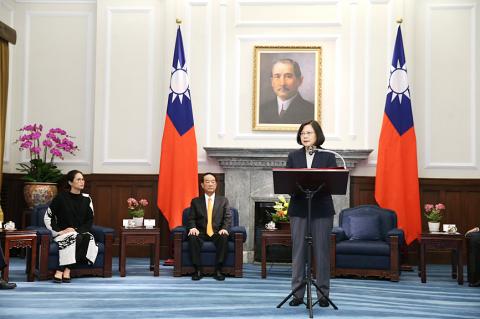President Tsai Ing-wen (蔡英文) yesterday said that Taiwan would show the world its ambition to be part of regional economic integration, as she hailed the significant progress made toward completing a Trans-Pacific Partnership (TPP) trade deal at last week’s APEC economic leaders’ meeting.
The progress made proved that promoting comprehensive economic and trade cooperation through dialogue and exchanges remains the common hope of all 11 nations involved in the TPP, Tsai said at a meeting with the Taiwanese delegation to the APEC summit.
Following the US’ withdrawal from the TPP, the remaining 11 nations, led by Japan, said on the sidelines of the APEC summit on Saturday that they had “agreed on the core elements” of the TPP, which is now officially called the Comprehensive and Progressive Agreement for Trans-Pacific Partnership.

Photo: CNA
The progress poses opportunities and challenges for Taiwan in its bid to join the TPP, Tsai said, adding that her administration would strive to show international partners in the region Taiwan’s desire to be part of regional economic integration by continuing to transform its industrial structure and improve business fundamentals.
Taiwan will seek out opportunities to make its voice heard in the world, continue to boost its international visibility and demonstrate what it can contribute to the international community, Tsai added.
Tsai’s envoy to the APEC summit, People First Party Chairman James Soong (宋楚瑜), said that the delegation did its utmost to ensure that the world heard Taiwan’s voice.
He said Taiwan shared its experience in the empowerment of women, the development of small and medium-sized enterprises, and its efforts to tackle climate change during the summit.
Tsai praised the delegation’s work at the summit held in the Vietnamese city of Da Nang.
She also praised Soong for helping leaders of other countries understand Taiwan’s key role in developing regional economic and trade links.
Tsai said Soong greatly helped advance the goals of the government’s New Southbound Policy through informal talks with nations that are the focus of the policy.
The policy is aimed at forging closer economic and trade ties with Southeast and South Asian nations, as well as New Zealand and Australia.
During the summit, Soong and other delegation members held bilateral or multilateral talks with leaders and representatives of APEC and ASEAN, including those from the US, Russia and Japan, Tsai said.
Taiwanese delegates also exchanged greetings with Chinese officials, she said.
Taiwan is determined to support the establishment of multilateral and regional free-trade agreements and enhance cooperation with countries in the region under the APEC framework, Tsai said.
After meeting with Tsai, Soong, in response to media queries, said that during his 30-minute meeting with Japanese Prime Minister Shinzo Abe on Sunday, Abe told him that all Asian nations share a common hope for regional peace.
However, when asked about the relationship between Taiwan and China, Abe did not give any suggestion on what Taiwan should do to address the cross-strait issue, Soong said.

Alain Robert, known as the "French Spider-Man," praised Alex Honnold as exceptionally well-prepared after the US climber completed a free solo ascent of Taipei 101 yesterday. Robert said Honnold's ascent of the 508m-tall skyscraper in just more than one-and-a-half hours without using safety ropes or equipment was a remarkable achievement. "This is my life," he said in an interview conducted in French, adding that he liked the feeling of being "on the edge of danger." The 63-year-old Frenchman climbed Taipei 101 using ropes in December 2004, taking about four hours to reach the top. On a one-to-10 scale of difficulty, Robert said Taipei 101

A preclearance service to facilitate entry for people traveling to select airports in Japan would be available from Thursday next week to Feb. 25 at Taiwan Taoyuan International Airport, Taoyuan International Airport Corp (TIAC) said on Tuesday. The service was first made available to Taiwanese travelers throughout the winter vacation of 2024 and during the Lunar New Year holiday. In addition to flights to the Japanese cities of Hakodate, Asahikawa, Akita, Sendai, Niigata, Okayama, Takamatsu, Kumamoto and Kagoshima, the service would be available to travelers to Kobe and Oita. The service can be accessed by passengers of 15 flight routes operated by

Taiwanese and US defense groups are collaborating to introduce deployable, semi-autonomous manufacturing systems for drones and components in a boost to the nation’s supply chain resilience. Taiwan’s G-Tech Optroelectronics Corp subsidiary GTOC and the US’ Aerkomm Inc on Friday announced an agreement with fellow US-based Firestorm Lab to adopt the latter’s xCell, a technology featuring 3D printers fitted in 6.1m container units. The systems enable aerial platforms and parts to be produced in high volumes from dispersed nodes capable of rapid redeployment, to minimize the risk of enemy strikes and to meet field requirements, they said. Firestorm chief technology officer Ian Muceus said

MORE FALL: An investigation into one of Xi’s key cronies, part of a broader ‘anti-corruption’ drive, indicates that he might have a deep distrust in the military, an expert said China’s latest military purge underscores systemic risks in its shift from collective leadership to sole rule under Chinese President Xi Jinping (習近平), and could disrupt its chain of command and military capabilities, a national security official said yesterday. If decisionmaking within the Chinese Communist Party has become “irrational” under one-man rule, the Taiwan Strait and the regional situation must be approached with extreme caution, given unforeseen risks, they added. The anonymous official made the remarks as China’s Central Military Commission Vice Chairman Zhang Youxia (張又俠) and Joint Staff Department Chief of Staff Liu Zhenli (劉振立) were reportedly being investigated for suspected “serious